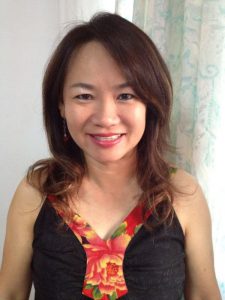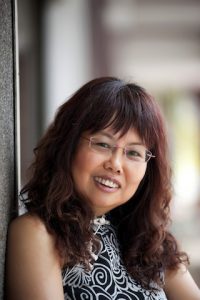Embracing menopause
Three women share their menopausal journey – the early signs, the experiences and the takeaways.
BY: Kimberly Seah
Menopause is a journey that women go through but few are willing to share. It is often viewed negatively and women dread what is considered part and parcel of what women go through as they age.
Ageless Online has found three 54-year-old women – Betty Teo (BT), Catherine Khoo (CK) and Jane Koh (JK) who are happy to open up on their journey. Betty is a retiree with two children; Catherine is a creative educator and publisher with three children; and Jane is a full-time homemaker and part-time Pilates instructor with three children. They share how this journey has changed them and offer some advice for other women who are going though menopause:
Can you share your menopause journey from the beginning and how you discovered that you were having menopause?
BT: When I was 50, I started experiencing hot flashes, night sweats and difficulty in sleeping.
At times, I could feel my body temperature soaring upwards from my tailbone right up to my spine, reaching a peak rapidly and then a burning sensation at the back of my neck. I also experienced palpitations, breast tenderness and a sensation of ants crawling on my skin. On some days, I felt restlessness, headaches and lack of concentration. I became moody at work and also lost interest in sexual intercourse.
CK: About a year ago, I started experiencing irregular periods and found myself becoming easily irritable. It felt like I was experiencing the symptoms of a hot flush, which resulted in me seeing a gynaecologist, who recommended Hormone Replacement Therapy (HRT).
During this period, I also started losing sleep and began to go for morning walks. I recalled this occasion when I ended up attending a mass service in church. I walked out of the church, realising that while I couldn’t change the circumstances, I could only change what I could do about it.
JK: At age 51, I found myself getting agitated easily. The hot flushes came shortly after. They occurred usually at night, lasting about half an hour or so. I was tired and feeling hot at the same time. As my sleep was affected, I would have migraine attacks the next day. As these migraines happened after a bad night’s sleep, I did not think too much about it initially.
I started researching about migraines and read about the hot flushes during menopause as I was experiencing short spells of heat when everyone was cool. However, as the migraine attacks became more often, I eventually went for a scan when I was 52 to eliminate other potential causes, which fortunately was the case.
During that time, I also started to pay more attention to the symptoms of menopause and realised that I was perimenopausing. Once I had established the fact that I was going through menopause, I became more relaxed. On reflection, if I had a better understanding of what perimenopause was, I would have been less agitated.
Did you know much about menopause at the time or even before?
BT: I had read some information on the topic in the magazines. I recalled my ex-colleague sharing her menopause symptoms some years ago. She was on HRT and suffered side effects of nausea, tremendous weight gain, fluid retention and severe mood swings.
CK: I knew that menopause would affect me around this age. Hence, instead of living in denial, I pro-actively sought confirmation through the gynaecologist.
JK: Until I started getting hot flushes and migraine attacks, I did not know much about menopause. Although I had heard about it, I was not quite bothered about what it was.
When did you go through perimenopause?
BT: At 45, I experienced very heavy menstrual bleeding and blood clots. Other than this, there was no presence of other symptom of menopause.
CK: I think it started some time early last year. Although I was busy running my own business in education and publishing, I went through a period of questioning myself about what I was doing. I think that was the beginning – when I started to doubt what I was doing.
JK: When I was between the age of 51 and 53.
Can you share an interesting story associated to your menopause journey?
BT: To overcome my mood swings and to avoid potential depression, I used lavender essential oil to diffuse and clean the air in my room. The relaxing effect of lavender worked more effectively for my husband to have more restful nights, leaving me alone to enjoy the warmth and redness of my face and body.
CK: Up to two years ago, I lived life according to others’ expectations. I was a good mother, a good wife and a good daughter-in-law. As I went through menopause, this question hit me “who exactly am I? Is there something I really want to do?” This resulted in me writing my book called “Love! Live Dangerously! And have Fun!: A Mother’s Lessons on Love, Hope, Loss and the Gifts of Life”, which was something I have always wanted to do but had postponed acting on it due to other demands of life.
JK: One day, at age 52, I was feeling edgy. I would pick a fight with the kids or anyone who came my way. Soon I realised everyone was being very quiet – even the TV was off. My husband later told me that everyone knew I was going through menopause, and they decided to stay out of my way and just do their own thing. I felt comforted then that they knew what I was going through.
How have you dealt with your menopause symptoms? Are you taking HRT or any other supplements such as calcium? What have been some side effects?
BT: I am not on HRT. Instead, I try to stay in air-conditioned rooms and have increased the intake of calcium and dairy products such as milk and cheese to keep my bones healthy. I also take minerals and vitamins as supplements to keep a balanced diet. I have also started exercising to build muscle strength and consulted my gynaecologist to confirm my menopausal status.
CK: HRT helps to increase the level of hormones and also reduce the risk of osteoporosis. I was on HRT for two months due to my gynaecologist’s prescription, but subsequently decided to stop the HRT. I believe that it is important to deal with the situation mentally. There will be times when I suffer from insomnia or experience a bit of irritability, but I have since learnt to deal with these symptoms.
JK: Usually, when I feel down, I would try to be active and stay very focused. I would tend to my plants. I would bake a cake. Clean out my cupboards. Prepare a special dish. Practise my taichi. Do a Pilates workout. Watch a real nice movie that either makes me laugh or cry. Call my sister and ask after her. By focusing on what you are doing, the menopause symptoms don’t seem to bother you so much.
I am not on HRT. Where possible, I try to manage it naturally, for example, taking a painkiller if a headache persists or doing activities to distract me from the symptoms. The human body is well-equipped to handle these phases in life. It is biological. We are made this way and hence the body will know how to handle it. For example when we are pregnant, we become stronger, physically and mentally. If we are weak, our body will automatically slow down till you become stronger.
Is exercise and regular health checks such as bone density checks important while you have menopause?
BT: To prevent osteoporosis, I signed up with a personal trainer for a six-month resistance programme to build muscle strength, improve cardio activities and reduce weight. I feel that my body has become more flexible and good mentally after completing the programme. I am no longer on any personal training programme. I have not done any checks on bone density.
CK: Yes. I have been going for Sunday morning walks with a group of friends around the same age. Exercise aside, the company is equally important. It started with physical activities and over time, the companionship and friendship have become an important aspect of the activity as well.
JK: I don’t know if it’s important for menopause. But when I exercise, I am in command of my body, and I feel good and happy. When one feels good, nothing else matters.
Women often associate menopause as a very negative thing. What have been the worse and the best thing having menopause?
BT: I did not have enough sleep with the hot flashes and insomnia. I was confused and anxious. Worst thing was feeling exhausted and miserable.
On the other hand, my face and skin were less oily on the surface. I did not have to worry about monthly cycles and no longer experienced heavy menstrual tension. Best thing was, I felt complete and ever ready to take on the second half of my life journey.
CK: The worst thing was that I realised I was not getting younger. For example, when my daughters grew older, I felt that they do not need me anymore, and hence, unwanted. This happened to my mum and I saw how it was happening to me.
The best thing was the realisation that how I lead my life is entirely up to me. I became responsible for my own happiness and no longer depended on others to be happy.
JK: The worst thing was knowing that age is catching up with you. The best thing was knowing that it is a brand new experience.
Is family support important during this time?
BT: Family support is very important to maintain physical, mental and emotional status. My husband travelled excessively at work and I had to manage all the symptoms independently. I doubt he is aware that I had completed my menopause adventure.
CK: Both my husband and children were supportive during this period when I started to pursue my own aspirations. I chose to be open about what I was going through and family support was there when I shared my experiences.
JK: Absolutely.
What advice/tips would you give other women going through it?
BT: My golf buddy felt hot flashes around her spinal and neck region. She sought chiropractic treatment only to find out that she was experiencing menopause symptoms. I would advise all women aged 40 to 50 to attend talks/workshops on menopause to know what to expect during the menopause process and how to manage its symptoms. A social support group related to this topic would be helpful particularly to women undergoing a challenging transition process.
CK: Women experiencing menopause should speak to other women. I find that WINGS is doing a good job by organising talks for women to talk about menopause, open up about the issues they face. More importantly, women no longer need to hide in a closet and learn to accept this as a part of life.
JK: Do your research. Discuss with those who have gone through it and how they managed the process. Learn from them. Stay engaged and be focused. Whether you are exercising or at work or working on your hobby, always put your mind into it. Don’t stay isolated and every woman should know that going through menopause can be very comforting.
Please complete this sentence – “Menopause is …”
BT: Wholesome.
CK: Freedom, liberation, because you worry less about a lot of things such as cramps and staining your panties during that time of month.
JK: Almost … almost refreshing. Almost … because it comes with some discomfort at first and there will be normal adjustment issues, both physically and psychologically. I’d liken these issues to adjustments one has to make when one moves into a new neighbourhood. We get used to feeling hot now and then; we get used to having a headache when things don’t go our way. And, we adjust. We change our wardrobes; we learn to stay calm when things don’t go our way. Eventually, we adapt.
Refreshing … because it is exciting! We are at a stage in our lives where the possibilities are new and endless, simply because we are more in tune with ourselves, more stable, more mature, and more experienced. There are just so many things we can do.
(** PICTURE (HOME PAGE): Road covered with leaves, caldexter, free images)




Thanks for the article. It is very assuring and affirming as I am going through the experience as well. Great sharing and advice by the three wonderful ladies!
We at Ageless Online are happy to hear this and glad that you found the story helpful.